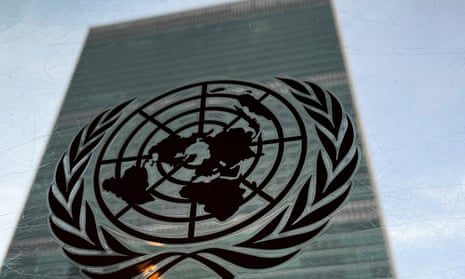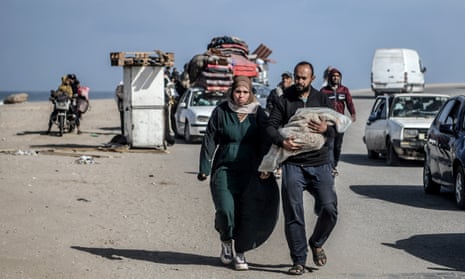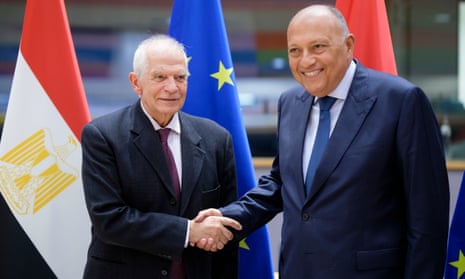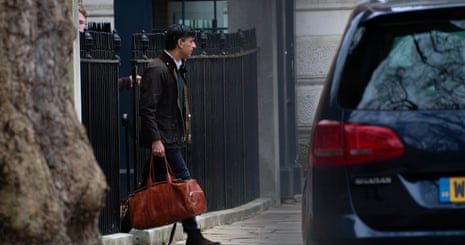Middle East crisis live: Six killed at UN-run shelter in Khan Younis after IDF says troops encircled Gaza city | Israel
Six people were killed at UN-run shelter in Gaza, UNRWA chief says
Six displaced people were killed after one of the UN-run shelters in Khan Younis, the focus of Israel’s ground offensive in the southern Gaza Strip, was hit “during military operations” yesterday, the commissioner general of the UN’s Palestine relief agency UNRWA has said.
“Terrified staff, patients and displaced people are now trapped inside the few remaining hospitals in Khan Younis as heavy fighting continues,” Philippe Lazzarini wrote on X on Tuesday.
He called on “all parties” to abide by international law and take every precaution possible to minimise harm and protect civilians, medical facilities and personnel.
One of the largest @UNRWA shelters in Khan Younis (southern #Gaza) was hit during military operations yesterday.
At least 6 displaced people were killed and many more injured during intense fighting around our the shelter.
Terrified staff, patients and displaced people are now… pic.twitter.com/tg6rOWQ6e2
— Philippe Lazzarini (@UNLazzarini) January 23, 2024
Key events
Protest by international aid bodies about catastrophic hunger and the danger of “looming famine” among Palestinians in besieged Gaza continues with the latest warning this hour from the World Food Programme (WFP).
The population of the Gaza Strip faces an increasing risk of famine as the Israel-Hamas war drags on, the United Nation’s WFP has declared anew, Agence France-Presse reports.
The situation in Gaza is of course slipping every day into a much more catastrophic situation … (with) a looming threat of famine”, Abeer Etefa, the WFP’s senior Middle East spokeswoman, told a press briefing by video link from the Egyptian capital, Cairo.
A study conducted between November 24 and December 7 found that all 2.2 million people in the Palestinian territory were in a crisis level of food insecurity. The picture has deteriorated since, said Etefa.
More than half a million people in Gaza are facing catastrophic food insecurity levels and the risk of famine increases each day,” she said.
Etefa noted there is something exceptional about the current situation, even with the long years of conflict in places like Syria, Yemen and Sudan.
In Gaza right now:
We haven’t seen that high a level of the number of people in these conditions in such a short span of time … (and Gaza has) the largest concentration of people in what looks like famine-like conditions anywhere in the world”.
The warning echoes earlier alarm today expressed by the United Nations Relief Works and Agency (UNRWA).
A key meeting of the United Nations security council is due to begin around three hours from now at the world body’s headquarters in New York City.
Several foreign ministers are flying in to add weight to their ambassadors and other diplomats as calls for Israel to allow more aid into Gaza and to accept a future Palestinian state are expected to dominate the discussions, as my colleague Patrick Wintour lays out in this piece.
The session is scheduled to begin at 2pm local time on the US east coast, which is 7pm GMT and 9pm in Gaza City and Tel Aviv.

Al Amal hospital in Khan Younis in southern Gaza is not far from where the Palestine Red Crescent Society (PRCS) has a centre with resources and is trying to arrange for ambulances to collect Palestinian civilians being wounded by Israeli attacks – but the organisation is having trouble.
Nebal Farsakh, a PRCS spokewoman, says on the clip that the Guardian’s video team in London put together, in translation, that the society’s ambulances are not able to leave the centre to reach the wounded in Khan Younis, “due to the siege on the centre and no vehicles being able to move.”
She said that the organisation lost contact with medical staff at the Amal hospital on Monday.
The Israeli authorities have insisted throughout the war on Hamas in Gaza that militants are using hospitals as cover, which Hamas and medical personnel dispute.
With so many lives in danger, thousands are now seeking to flee Khan Younis, many already having traveled there from central and northern Gaza as Israel’s assault on the Palestinian territory began there after Hamas’s attack on southern Israel on 7 October, where fighters killed around 2,400 people and took hostages, more than 100 of which remain captured in Gaza. People are fleeing on foot, by bicycle, donkey cart of laden vehicles, whatever they can muster.

Disturbing scenes have emerged in Khan Younis in southern Gaza.
The Israeli military says it now has the city surrounded and the Palestine Red Crescent Society says hospitals are under siege and al-Amal hospital is encircled, amid continued bombardments.
The Guardian’s team in London has put together a short video of footage emerging from the area, which, to warn readers, has some disturbing footage as injured people try to get to hospital and get treatment.
Summary of the day so far…
-
Six displaced people were killed after one of the UN-run shelters in Khan Younis, the focus of Israel’s ground offensive in the southern Gaza Strip, was hit during military operations yesterday, the commissioner general of the UN’s Palestine relief agency UNRWA, Philippe Lazzarini, said.
-
Egypt’s foreign minister, Sameh Shoukry, said the “devastating scale of loss of life” in Gaza “is unacceptable, is unprecedented and it is just a blemish on the international community’s moral perspective”.
-
The United Nations Relief Works and Agency has said 570,000 people in Gaza face “catastrophic” hunger. “Intense fighting, access denials & restrictions + communications blackouts are hampering UNRWA’s ability to safely & effectively deliver aid,” the agency said in a post on X.
-
Twenty-four Israeli soldiers were killed in Gaza on Monday, by far the biggest single-day Israeli death toll in the three-month-old war. An Israeli military spokesperson said 21 soldiers were killed when two buildings they had mined for demolition collapsed after militants fired grenades at a nearby tank. Reports in local media said explosives set by the soldiers detonated prematurely. Earlier, the military said three soldiers were killed in a separate attack in southern Gaza.
-
Israel’s president, Isaac Herzog, said it had been an “unbearably difficult morning” after hearing news of the deaths of the Israeli soldiers in Gaza. The prime minister, Benjamin Netanyahu, said Israel would push on with fighting in Gaza until “absolute victory”.
-
The Palestine Red Crescent Society said Israeli bombardment was continuing in the vicinity of al-Amal hospital in Khan Younis, in the southern Gaza Strip, with gunfire from Israeli drones targeting “anyone moving around” the hospital.
-
The Gaza health ministry said a total of 25,490 Palestinians had been killed and 63,354 injured in Israeli strikes on Gaza since 7 October. At least 195 Palestinians had been killed and 354 injured in the past 24 hours, the ministry added.
-
Israel’s military said its troops had encircled Khan Younis. “Over the past day, IDF troops carried out an extensive operation during which they encircled Khan Younis and deepened the operation in the area. The area is a significant stronghold of Hamas’s Khan Younis Brigade,” the military said.
-
The UK’s foreign secretary, David Cameron, said action to degrade Houthi military capabilities would continue after the UK and US launched a fresh wave of airstrikes against the rebel group on Monday. “What we’ve done again is send the clearest possible message that we will continue to degrade their ability to carry out these attacks,” he told broadcasters.
-
A Houthi army spokesperson said the latest US-UK strikes against the rebel group in Yemen would not go “unanswered” or “unpunished”.
-
Israel has given Hamas a proposal through Qatari and Egyptian mediators that includes up to a two-month pause in the fighting as part of a multi-phase deal to free all the hostages being held in Gaza, Axios reported on Monday. The first phase would reportedly involve the release of women, men over 60 and those in critical medical condition.
Reuters has posted this update on the newswires:
At Khan Younis’s main Nasser hospital, the biggest still functioning in the Gaza Strip, bodies were being buried on the grounds because it was unsafe to go out to the cemetery.
Footage filmed by Palestinian journalist Hamdan El-Dahdouh showed persistent gunfire hitting the top of the main building.
“I am besieged at Nasser hospital now and my life is in great danger. The smell of death, the only smell I know, is filling the place,” Dr Mahmoud Abu Shammala posted on Facebook.
“I lived this war as a hero, and if I die I will die a hero.”

Patrick Wintour
The UK must stand by the state of Israel and its right to defend itself as it deals with the terrible consequences of the Hamas attacks on 7 October, David Cameron, the UK’s foreign secretary, insisted as he was joined by a 93-year-old Holocaust survivor at a ceremony in the Foreign Office marking Holocaust Memorial Day.
Eva Kugler, a young girl at the time Germany swept through Poland and France, admitted she was angry that Israel was now being likened to the Nazis and condemned Hamas, saying: “I feel they have been indoctrinated against Israel as Hitler indoctrinated the German people in the same way as the Nazis. The Holocaust was all over Europe and north Africa; we can only hope this does not spread, but Jewish people have been attacked for 5,000 years, sadly.”
Cameron described the murder of 6 million Jews in the Holocaust as “humanity’s darkest hour” and promised “to recommit to rid the world of the prejudice and hatred that persists today”.
He said two of the most unforgettable experiences of his life had been a visit to Auschwitz nine years ago to see “the architecture of mass murder and the mechanics of death” and a visit last year to the Be’eri kibbutz in Israel where he saw how horror had been brought to “a place of peace and beauty in the desert”.
He recalled seeing “the bullet holes in the walls, the blood on the floor, and the cupboards that had been full of children hiding before they were pulled out and murdered in front of their parents. It was the most deadly assault on Jewish people since the Holocaust.”
As a result, he said, “it has never been so important to say so clearly we stand with the Jewish people, the state of Israel and their right to defend themselves as they go about dealing with this terrible problem of dealing with the legacy of 7 October.”
Speaking at the same ceremony, the Israeli envoy to the UK, Tzipi Hotovely, said the phrase “never again” seemed hollow after 7 October when “1,200 innocent people had been killed by the same poisonous hatred of the Jewish people that fuelled Nazi Germany during the Holocaust”.
“Jewish people in Britain were becoming fearful of showing themselves, or Jewish symbols,” she said.
Eric Pickles, the government’s envoy for post-Holocaust issues, attacked “the useful idiots who are willing to march alongside outright racists”.
Accusing Hamas of necrophilia and paedophilia in its attacks on Israelis on 7 October, he said he had been shocked to hear imams in the UK prepared to say Hamas had acted in self-defence. He said denial was the final stage of genocide and claimed “denial alongside distortion represented formidable obstacles to the truth”.
Six people were killed at UN-run shelter in Gaza, UNRWA chief says
Six displaced people were killed after one of the UN-run shelters in Khan Younis, the focus of Israel’s ground offensive in the southern Gaza Strip, was hit “during military operations” yesterday, the commissioner general of the UN’s Palestine relief agency UNRWA has said.
“Terrified staff, patients and displaced people are now trapped inside the few remaining hospitals in Khan Younis as heavy fighting continues,” Philippe Lazzarini wrote on X on Tuesday.
He called on “all parties” to abide by international law and take every precaution possible to minimise harm and protect civilians, medical facilities and personnel.
One of the largest @UNRWA shelters in Khan Younis (southern #Gaza) was hit during military operations yesterday.
At least 6 displaced people were killed and many more injured during intense fighting around our the shelter.
Terrified staff, patients and displaced people are now… pic.twitter.com/tg6rOWQ6e2
— Philippe Lazzarini (@UNLazzarini) January 23, 2024
‘Devastating scale of loss of life’ in Gaza is ‘unacceptable’ and ‘unprecedented’, Egypt’s foreign minister says

Lisa O’Carroll
Egypt’s foreign minister, Sameh Shoukry, has said the “devastating scale of loss of life” in Gaza “is unacceptable, is unprecedented and it is just a blemish on the international community’s moral perspective”.
He called for an immediate ceasefire to deal with the “inhumane conditions that the people of Gaza are suffering under, absolutely horrendous, tragic, painful conditions.”
He warned that unless the world dealt with the displacement of Palestinians fleeing the bombing from Israel, the security of the wider region and Egypt would be at risk.
Shoukry said rhetoric was not enough. “The deprivation of their basic needs water, food, medicine, healthcare, sanitation, not being provided will make the conditions and Gaza unliveable in itself, and will induce displacements.
“If we don’t take measures to offset the potential of displacement, then displacement will occur and its consequences will be a further complication to the situation, will be a direct challenge to Egypt’s security,” he told reporters in Brussels.

Lisa O’Carroll
The EU and Egypt have signed a framework agreement to strengthen economic and political ties as fears grow over further displacement of people from Gaza in the region.
Unveiling the deal, Josep Borrell, the EU’s chief diplomat, paid tribute to Egypt’s role in getting aid to Gaza and said the new deal would give Egypt access to some EU programmes including the Horizon research fund.
The deal, which is expected to lead to a fully blown partnership agreement in the next month, will draw on a €9bn fund already agreed to strengthen economic ties.
The EU’s neighbourhood commissioner, Olivér Várhelyi, described the deal as “the beginning of the golden age”, adding that it was based on “six pillars” of investment in the economy, water and food security, green energy and assistance with migration.

Egypt’s foreign minister, Sameh Shoukry, said the deal “recognised that what happens in Egypt and in our region has a direct effect on conditions in Europe and what happens in Europe equally has an effect on Egypt and its adjoining regions whether it is the Middle East or Africa.”
Egypt already offers refuge to millions of people who have fled south Sudan, Eritrea and Yemen and has so far resisted the establishment of refugee camps on the Gaza border.
Asked about the possibility of future funds, he said he did not take the “Dickens perspective of I want more (money)” but his aim was for his country’s needs to be met through “a healthy and productive relationship that responds to the interests of both sides”.
Reuters reports that the Israeli government spokesperson Eylon Levy has restated Israel’s position that it will not agree to a ceasefire deal with Hamas that leaves its hostages in Gaza or Hamas in power in the territory. He added that efforts were ongoing to bring about the release of the hostages, but declined to elaborate, saying lives were hanging in the balance.
Michael Segalov has interviewed Tal Mitnick, the first conscientious objector to be jailed in Israel since the 7 October attack:
Mitnick said he had known he wouldn’t serve for many years. While he studied maths and computer science at school, a teacher suggested his natural aptitudes would suit a role in an elite intelligence unit. “So I looked into it more. Intelligence units, I learned, blackmail LGBTQ+ Palestinians and people needing health treatment in Israel into being informants. I started to see how the system is built on oppression. Once I realised this, I knew I had to not only refuse but also work against it.”
The events of 7 October only affirmed his decision. “Israel has already lost this war,” he believes. “More killing and more violence won’t bring back the lives lost on 7 October. I know people are hurt. Traumatised. But this doesn’t make anything better. To root out extremist ideas from Palestinian society, we must root them out in Israel.”
For first-time refuseniks, seven to 10 days is a standard sanction. On 26 December, Mitnick received 30 days, to be spent at a prison just outside the town of Kfar Yona. “I don’t see myself as the hero or anything,” he says, “while people are being massacred every day in Gaza.”
Read more here: ‘More killing won’t bring back lost lives’ – Tal Mitnick, 18, on going to prison instead of joining IDF
Logitech International has said it is facing 30-day delays in getting its products from its factories in Asia to Europe due to the Red Sea crisis, Reuters reports.

Andrew Sparrow
The UK prime minister, Rishi Sunak, has told MPs in the House of Commons that the latest airstrikes against the Houthis were only part of a “wider response” to the Houthis being taken by the government.
He said the government was increasing diplomatic engagement in the region, working to end the supply of arms to the Houthis, using sanctions to try to cut off their funding and delivering humanitarian aid to help people in Yemen who have suffered from the civil war.
He claimed there was no link between what the government was doing and the conflict in Gaza. He said people who glorified the Houthi attacks were glorifying terrorism, and that would be met by a zero tolerance response.
You can read the latest updates on UK politics in this liveblog.
Hezbollah said on Tuesday that it struck the Israeli air control base of Meron for a second time in recent weeks, in response to Israeli “assassinations” and attacks on civilians.
It comes after security sources told Reuters that two Hezbollah fighters were killed on Sunday when an Israeli drone hit their vehicle in southern Lebanon.
Hezbollah, the Lebanese Shia movement backed by Tehran, has been trading fire across Lebanon’s southern border with Israeli forces in support of the militia group’s Palestinian ally Hamas in the Gaza Strip.
The United Kingdom Maritime Trade Operations (UKMTO) agency said on Tuesday that it had received a report of uncrewed aerial system activity in the vicinity of 46 nautical miles south of Yemen’s port city of Mokha.
The UKMTO said authorities were investigating. We will give you more information as updates come in.
UNRWA: 570,000 people in Gaza face ‘catastrophic hunger’
The United Nations Relief Works and Agency (UNRWA) has warned that 570,000 people in Gaza face “catastrophic hunger”.
In a post on X, it wrote:
Intense fighting, access denials & restrictions + communications blackouts are hampering UNRWA’s ability to safely & effectively deliver aid.
As risk of famine grows, the UN calls for a critical increase in humanitarian access.
570,000 people in📍#Gaza face catastrophic hunger.
Intense fighting, access denials & restrictions + communications blackouts are hampering @UNRWA‘s ability to safely & effectively deliver aid.
As risk of famine grows, @UN calls for a critical increase in humanitarian access. https://t.co/fhlAGyJ8BQ
— UNRWA (@UNRWA) January 23, 2024
Israel’s war has displaced most of Gaza’s 2.3 million population and caused acute shortages of food, water and medical supplies.
In Rafah and Khan Younis, in the south of Gaza, tents and makeshift dwellings cover almost all available ground, with multiple families crammed into apartments, in UN-run shelters in schools or sleeping on the floors of hospitals.
The UN humanitarian office this month said Israeli authorities were systematically denying it access to northern Gaza to deliver aid and this had significantly hindered the humanitarian operation there.
Israel, which has previously denied blocking the entry of aid, will face pressure to allow more aid into Gaza at a meeting of the UN security council in New York on Tuesday.


